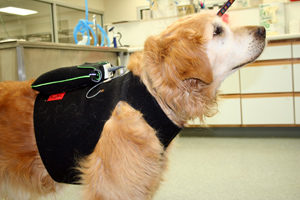Event Recorders & Holter Monitors for Pets
Holter monitoring allows the continuous monitoring of heart rate and rhythm during normal daily activities and sleep. It can help detect and analyze infrequent heart arrhythmias, and aids in the diagnosis of episodic weakness and collapsing events. It may also be used in the assessment of anti-arrhythmic drug therapy. The Holter monitor is a small cassette recorder secured to the pet by a harness for 24 hours at a time.

Jack posing in his holter monitor.
The information on the tape is downloaded to cardiology equipment for analysis. While the holter monitor is on your pet, you will be called upon to keep a diary noting the time of any clinical signs and changes in activity. Entries should include times when your pet was sleeping or exercising; this information can be matched with any heart changes found in the analysis.
Event Recorders
A cardiac event recorder is a portable microprocessor with a memory loop that can be activated when the pet experiences an episode of collapse or weakness. This can help diagnose infrequent arrhythmias or heart conditions. The machine is smaller than a Holter monitor and can be worn more easily by cats and small dogs for up to a week at a time. It is attached to the pet with a harness or chest wrap.
When the pet experiences an episode, the record button should be pressed; the recorder will then store data starting about 15-30 seconds before the button was pressed until about 15-30 seconds after the button was pressed. The event recorder can then be taken off the pet and heart data can be obtained. A diary kept during the monitoring period would be useful to correlate clinical signs with any cardiac events.